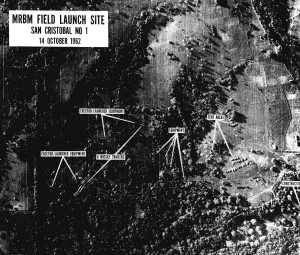
NOVA MCGILL
Contributor
In an unprecedentedly somber television address, President John F. Kennedy announced on October 22, 1962 that U.S. spy planes had discovered Soviet bases with Russian missile installations in Cuba. These installation sites at the unfinished bases were near completion, and included medium-range missiles that could strike a number of the United States’ larger cities, including Washington D.C.
Kennedy announced that he was ordering a naval “quarantine” of Cuba to prevent Soviet ships from bringing any further offensive weapons to the island, and stated that the United States would not tolerate the existence of the current missile sites. The president signaled that America would not shy away from using military force to shut out what he described as a “clandestine, reckless, and provocative threat to world peace.”
What became famous as the Cuban Missile Crisis actually began on October 14, 1962—the day when U.S. intelligence officials reviewing reports from U-2 spy planes detected the Soviets building medium-range missile complexes in Cuba. A day later, President Kennedy secretly convened an emergency meeting of his most senior military, political, and diplomatic advisors to discuss the ominous news. The group came to be known as ExComm, short for Executive Committee.
After rejection of a surgical air attack against the missile sites, ExComm decided on a naval quarantine and an appeal for dismantling the bases and withdrawal of missiles. Kennedy delivered his address to the nation on the night of October 22 on television in order to make his announcement. During the next six days, the crisis was strained to the brink of collapse when the world hung in the balance of nuclear war between the two superpowers.
On October 23, the quarantine of Cuba began, but Kennedy chose to give Soviet leader Nikita Khrushchev a little more time to think about the U.S. measure by extending the quarantine line 500 miles. By October 24, Soviet ships en route to Cuba with the ability to carry military cargo appeared to have slowed down, altered course, or even turned back as they approached the quarantine. The only exception was one vessel—the tanker Bucharest. At the initiative of more than 40 nonaligned nations, U.N. Secretary-General U Thant personally appealed to Kennedy and Khrushchev in a call on their governments “to refrain from any action that may aggravate the situation and bring with it the danger of war.” On the Joint Chiefs of Staff’s instructions, U.S. military forces went to DEFCON 2, the highest state of military readiness ever attained in the postwar era, as military commanders prepared for all-out war with the Soviet Union.
Photo via the John F. Kennedy Presidential Library and Museum

